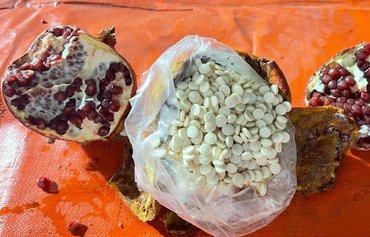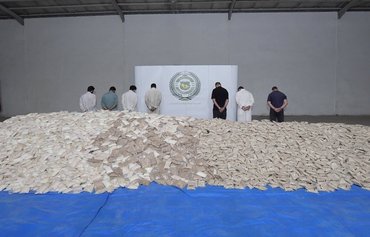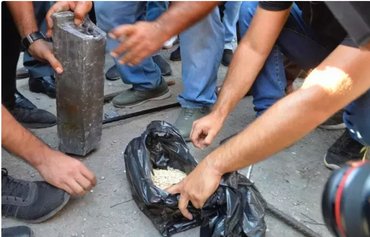BEIRUT -- Saudi customs officials stationed at the kingdom's ports have blocked numerous drug-smuggling attempts, preventing shipments of narcotics concealed in various guises from entering the country.
Many of these shipments can be traced back to Hizbullah, with the drugs originating in Captagon workshops in areas of Syria and Lebanon controlled by the Iran-backed party, which has a long history of dealing in narcotics.
Recent smuggling attempts have been thwarted by the vigilance of customs officials and by civilian tip-offs -- including from disgruntled insiders who feel cheated out of their share of the profits, security sources said.
Saudi authorities on April 22 thwarted an attempt to smuggle more than 3.7 million Captagon pills hidden in iron pillars in the port city of Dammam on the Arabian Gulf.
![An officer of the Directorate of Narcotics Control of Saudi Arabia's Interior Ministry empties a bag of Captagon pills seized during a special operation in Jeddah on March 1. [Fayez Nureldine/AFP]](/cnmi_am/images/2022/05/05/35234-Saudi-drug-bust-600_384.jpg)
An officer of the Directorate of Narcotics Control of Saudi Arabia's Interior Ministry empties a bag of Captagon pills seized during a special operation in Jeddah on March 1. [Fayez Nureldine/AFP]
In March, the Saudi narcotics control authority blocked another attempt to smuggle 3.3 million amphetamine pills hidden inside a shipment of oranges.
In June 2021, Lebanese authorities seized a large cache of Captagon pills hidden in small generators bound for Dammam in Saudi Arabia.
In another notable bust, Saudi customs officials discovered more than five million Captagon pills hidden in a pomegranate shipment from Lebanon in April 2021.
The drug smuggling attempts prompted the kingdom in April 2021 to ban the import of fruits and vegetables from Lebanon and their transit through its territory.
"The kingdom's authorities have in the past six years foiled attempts to smuggle more than 600 million amphetamine pills" coming from Lebanon alone, General Directorate of Narcotics Control spokesman Maj. Mohammed al-Nujaidi said in March.
He accused the "Hizbullah terrorist militia" of being "the main source smuggling them and manufacturing them".
The kingdom's efforts to combat drugs are "clear and evident to all citizens", Saudi Brig. Gen. Abdullah Muhammad al-Humayqani told Al-Mashareq.
Large quantities of illegal drugs have been apprehended at Saudi seaports, land crossings and airports, with most shipments originating in "the southern suburb of Beirut, which is controlled by Hizbullah", al-Humayqani said.
"Hizbullah is targeting the kingdom and its youth with drugs, and it is the largest source of [drugs] and has used all means to export them," he added.
The Iran-backed party "has harmed Lebanese farmers by trying to export the drugs in [shipments of] pomegranates, oranges, vegetables and fruits", he said, and will continue to do so for as long as it remains in lockstep with Iran.
Tipsters and informants
Lebanese security services "are carrying out their duties to the fullest extent in the area of combating drug smuggling to Saudi Arabia and Arab countries, despite their limited capabilities", former minister Marwan Charbel said.
Investigations "are still ongoing to identify the source of the smuggling and who is behind it, especially the Captagon found in pomegranate and lemon shipments", he told Al-Mashareq.
Informants have played a key role in uncovering these operations, he said.
Some insiders who are in on the deal and even help to package up the drug shipments "later tip off the security services about them after disputes occur over the deals and division of spoils", he added.
A Hizbullah opponent, who asked to remain anonymous, explained that the Lebanese security services "have informers in Hizbullah's orbit".
These informers, entrusted by Hizbullah to pack drug shipments to be smuggled abroad, tip off security agencies about the shipments and the date of their arrival at the port of Beirut, he told Al-Mashareq.
"Members of drug smuggling networks often tip off the security agencies about shipments and when they will be shipped after disagreements break out among them over shares and profits," he said.
To report any illicit drug activity, contact Saudi Arabia's narcotics control at the Ministry of Interior: +966 011-4629393 or [email protected].
According to the Hizbullah opponent, there have been disagreements between the Syrian regime's 4th Division and Hizbullah over the division of profits, and Hizbullah's sale of drugs at the entrances to Syrian schools and universities.
This friction prompted the 4th Division, which is led by Bashar al-Assad's brother, Maher, and has a long history of drug trafficking itself, to tip off the Lebanese security services about Hizbullah's shipments to Saudi Arabia, he said.
Since Hizbullah became a partner of the Syrian regime, he said, it has ramped up its smuggling activity: opening illegal border crossings, stepping up the cultivation of drugs and establishing new drug manufacturing factories in Syria.
Arms smuggling
In addition to smuggling drugs, which provide vital revenue streams to Iran and its proxies, Iran and its affiliated militias across the region have engaged in arms smuggling, sources said.
Through its proxies, the Houthis, Iran has turned Yemen into a hub for the export of ammunition and weapons to terrorist groups in Somalia, in violation of United Nations Security Council resolutions, they said.
Iranian weapons supplied to the Houthis in Yemen are being smuggled to Somalia, and from there potentially to other conflict zones in Africa, the Global Initiative Against Transnational Organised Crime reported in 2020.
"Iran's supplies of weapons and ammunition to the Houthi insurgency have been well documented in a series of maritime seizures of dhows dating back to 2015," the July/August 2020 Risk Bulletin said.
"Evidence has emerged to suggest that some of these Iranian weapons may subsequently be trafficked by criminal networks into the Horn of Africa from Yemen (or even be diverted while en route to Yemen)," it said.

![An officer with the Saudi Directorate of Narcotics Control shows amphetamine pills hidden inside a shipment of oranges in March in Jeddah. [Saudi Directorate of Narcotics Control]](/cnmi_am/images/2022/05/05/35259-saudi-drug-bust-600_384.jpg)







Welcome in America!
Reply2 Comment(s)
The conflict in Yemen is aimed at dividing the country and people. Yemen is one of the most important geographical locations in terms of climate and geographical locations. Yemen has some of the most important coasts.
Reply2 Comment(s)